In our little village, people have so many needs, and they are poor. Even those who are fortunate enough to have regular work likely only make enough to eat. (“Give us this day our daily bread” takes on real meaning here.) True, some are more well-off than others, but when unexpected illness strikes, it can quickly tap a family’s resources. That’s why the Medical Missions work of KDM is such a blessing to folks here. Let me give you the skinny on this month’s budget figures, but please read on for particulars and for stories/pictures. This month, our Acute/Emergency funding was $250; we spent $435. Our “Special Cases” funding was $1000; we spent about $1400. (Many of these were continuing cases that we just couldn’t drop in mid-stream; once a commitment is made, we feel we must continue until the need is met.)
I can’t count the number of times people have visited our home or the KDM office looking for help with a child or family member who has malaria. I ask them, “Have you taken medicine?” (If they have, and it hasn’t worked, they must go to the clinic for injections; however, if they haven’t, we have some malaria medicine ready on the shelf.) More often than not, they reply in the affirmative—Yes, they have taken medicine and the person is still sick! But upon further questioning, I find that they have taken “Action” or “Mara Moja.” What’s that? Why, pretty much Excedrin, or ibuprofen, or Tylenol. So their symptoms improve for a time, but when the underlying malaria is unmasked once again, the symptoms are worse and often harder to treat with over-the-counter medicines. Why is this so? Simple answer is, they’re doing the best they can with what they have. In our village center (several kilometers’ walk), there is a chemist (pharmacy of sorts) where one can buy malaria medicine, but to do that and pay for the transport on a piki piki is more than most people can manage. So they go to the local duka (small shop, where they probably also get their daily needs of soap, sugar, or vegetables) and pick up some pain reliever/fever reducer while they are there—a two-tablet package for 5 shillings (about 5cents).
We have a regular Medical monthly stipend of $200 that comes in from generous donors state-side; this is the lifeblood of our medical missions, which is designed to treat acute and emergency illnesses and injuries. There are plenty of those, and we’ve never “not” used up our $200 allotment. That, plus the irregular giving for Urgent Needs that comes in throughout the course of a given month has almost always been enough. If you follow us on Facebook or read our blog (even though we admittedly post pretty irregularly), you know that we also fundraise for larger amounts for a needed surgery or other out-of-the ordinary circumstance. For example, last month we funded a $1,500 surgery to re-set the broken arm of an ex-Muslim convert who is struggling to raise his 7 children on his daily wage from driving a piki piki. We also were able to remove the nasal polyp of a 4 year-old boy that became so large it fractured his nose. How can we say no to these needs? We think, What if it was my child?
This week our 8 year-old Micah suddenly spiked a 104.5 degree fever in the evening. Malaria, for sure. I gave him some malaria tablets and an ibuprofen, which he promptly threw up. When Marc came home from attending communion, he gave Micah an injection (“a shot in the behind,” which no one likes, but which is necessary when you’re vomiting!). We are fortunate enough to have a well-stocked medicine shelf…but we know others do not. And that’s “just” malaria, never mind a traumatic injury.
We had approximately $250 come in during January that was earmarked for regular medical needs, and we spent $435. We also fund-raised for special medical needs to the tune of $1,000, but spent almost $1,400. (The balance for both deficits came out of our “general fund,” which also met a big tax burden this month and dished out a major sum of money to do our Kenyan NGO’s annual returns. I don’t mind being honest enough to say that our general fund is now depleted. That’s how we fund our monthly missions, which by necessity are now going to be quite bare-bones. That’s more than unfortunate.) So look with me at our last month of medical missions, where we well over-spent our monthly budget for the first time ever…but it was necessary, and everyone who was treated would say unequivocally that it was worth it.
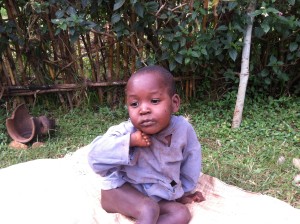
Most of our regular medical cases are referred to a local clinic that is close (cheaper on transport costs) and comparatively inexpensive. This month, we treated many cases of malaria, brucella, and typhoid. That’s pretty routine. We also bought Hypertension medicines for a couple of Mamas in our fellowship, which we have done regularly for many months now. Why, since this is not an acute or emergency need? It’s a simple matter of economics. The monthly medication they need to control their hypertension costs about $3. When we were *not* buying it, these same Mamas would end up with an “acute” illness and get treated at the clinic, to the tune of $20 or more. This happened several times within a six-month period before we got wise and realized that it made more sense to spend the $3 per month. Now everyone is happy, and so is our medical budget.
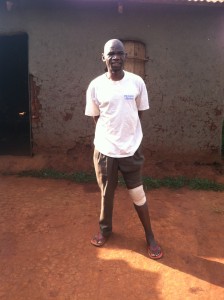
I think one reason our medical budget was higher than usual this month was because of the sheer number of cases that had to be referred to the District hospital. (This costs more on transport, and more for treatment.) For example, Pius Omule had a motoribike accident some time ago, and tried to treat it at home. Later, however, it became swollen and infected. At that point, he came seeking help that he could not afford and he was taken to the District Hospital. He had to go back several times over the course of the month, to scrape, clean, bandage, and re-bandage the wound, as well as get antibiotics.
On a Saturday morning, an elderly widow with a severely broken ankle was carried by piki piki to our door (imagine that…how uncomfortable!). She had to make the journey to District Hospital via public transport for casting.
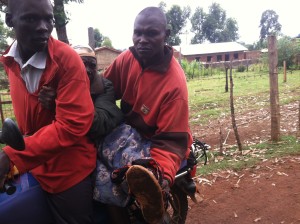
Another referral to District hospital was Anna, who got gouged in the eye by a bull. Apparently her eyeball was actually popped back into its socket at the scene and again, they played the “wait and see” game, but after a time her eye was severely swollen and bruised, so she was brought to us. The District Hospital tried to treat the eye but determined that it would need to be sewed shut. We learned that she had already had limited use of the eye for some reason, so the disappointment over the complete loss of the eye was somewhat mitigated.
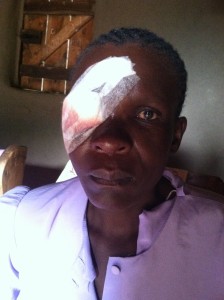
Special medical needs are also part of our scope and we fund-raise on a case-by-case basis. Our biggest special medical need this month was for Victor, who was sent to Kampala, Uganda for a second round of radiation in hopes of fighting back against the continued onslaught of cancer in his body. The entirety of our Special Medical funds ($1000) were earmarked to Victor, and we sent him to Kampala with approximately $1,060, which we are hopeful will meet all the financial need. Please pray for Victor’s perseverance and healing.
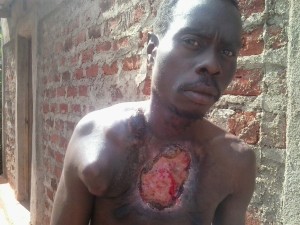
The $400+ overage in our special medical spending went to several patients. We have a few “special” cases of folks who are assisted with getting their monthly HIV medications at the District Hospital. The medicine is free, but transport is a burden so in many cases, we help. One of those cases is Sharon, a two year-old whose mother died of HIV last year and left her an orphan. Another is Daniel, a 14 year-old boy in our Saboti fellowship whose mother had HIV and passed away within the last year (he was treated this month for complications from his TB). Our dear friend, Silas, has a real heart for HIV education and treatment, and this month he asked us if we could help Dickson, a man he knew in the community. As a first step, we also tested Dickson’s wife and children. Unfortunately, his wife and youngest child (about age 2) also tested positive. We brought Dickson and his daughter to the hospital for their first round and second rounds of medications this month.
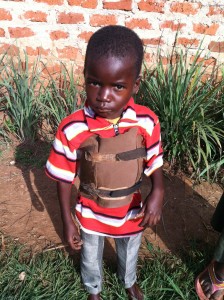
Also on the special medical front, we needed to follow up on the treatment for our brother Ishmael’s severely broken arm, though his earmarked funds had been depleted last month following the surgery. We also had some unexpected follow-up on an old case of Spinal TB for 5 year-old Michael Wafula, whose earmarked funds had also run out. He needed new body bracing for correction of his spine, as he was rapidly outgrowing his existing brace. In order to do that, several other steps needed to be completed first, including scans and cortisone injections. We operated on a negative budget for him in January, but thankfully we’ve gotten a generous donation to re-coup those funds and proceed with work in February.
If you would like to help us fortify our all-important (but oft-neglected) General Fund, or donate to support continued Medical Missions (a need which we see increasing, rather than diminishing), please do so at www.KingdomDriven.org/donate. A monthly subscription donation will help us the most, as we will then have a known budget to work within, but all gifts are of course appreciated. Thank you for your giving and also for your ongoing prayers for the mission here and the folks we serve.
